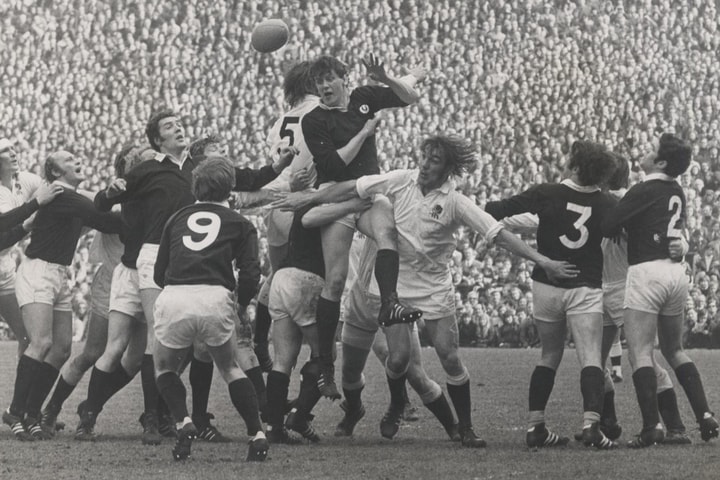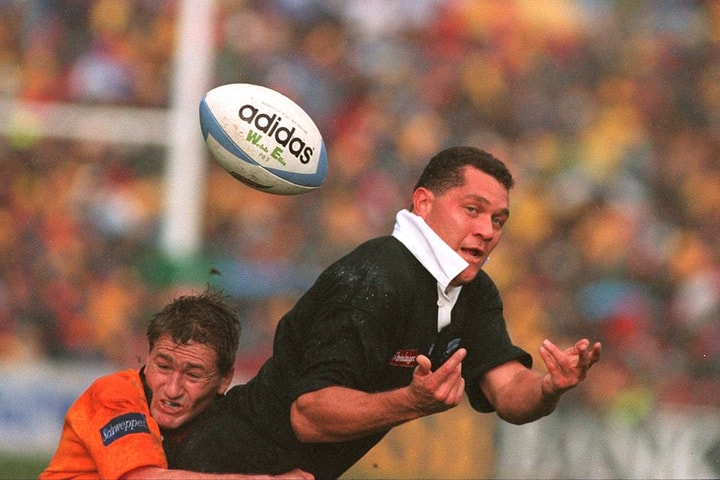The man who most attracted my attention at Bristol was G. W.
Smith, a threequarter who made dazzling swerving runs which
reminded me of Arthur Gould at his best. In the games that
followed, the All Blacks revealed quite wonderful scoring power,
and when they met Wales at Cardiff they won twenty-seven matches,
had scored heavily in most of their games, had never fallen below
double figures, and had beaten Scotland by 4 tries to a dropped
goal and a try; Ireland by 3 goals to nil, and England by 5 tries
to nil.
Clubs, counties, provinces, universities, and countries had
toppled down; in the last match before they faced Wales they had
beaten Yorkshire by 5 goals 5 tries to nil. "What a team! What a
record;" sighed the supporters of Wales on the eve of this greatly
memorable game-doubtful if their players could hold out against the
visitors. But they did.
Sometimes great expectations are not realised. Sometimes we have
looked for wonders, strung up to the highest pitch of excitement,
only to find that the actual game fell flat. But it was not so when
the All Blacks visited Cardiff on December 16th, 1905. Excitement
was at fever heat. Never before or since have I known anything like
it.
The crowd was the biggest ever seen at Cardiff till that time-at
a quarter to two the gates had to be closed. When the teams took
the field thousands were quivering with excitement-some of us were
so affected that we could hardly speak or write. The very air was
charged with emotion. Hopes and fears were blended in an aching,
choking anxiety. What the crowd felt was communicated to the
players, and in the opening minutes they were so wrought that
finish went to the winds.
Most of the play at first was with the forwards, and it seemed
as if both packs were determined to see how much punishment (within
or a little beyond the laws) their opponents could survive. No
quarter was given by either side. Men were toppled over like
ninepins-flung aside, dashed to the ground. It was one of the
three fiercest games I have seen.
Early it was evident that, to last out, a man had to be as hard
as nails and trained to the hour. That they proved to be. Soon
the players shed their excitement without moderating their vigour.
The clash at the line-out and in the loose continued to be
terrific, but there was more of plan and purpose. The Welsh backs,
soon masters of themselves, kicked to touch with great effect.
Both sides heeled, passed, and ran. But nothing came of it - the
tackling was deadly. Cross-punts were tried by Welshmen and New
Zealanders, but the defence was watchful and sound. Every move
seemed to be foreseen. Never was there a hesitant or half-hearted
tackle.
At quarter time nothing had been scored, but the Welsh team had
more than held their own, and for the first ten minutes of the
second quarter they had the better of the play. Once there was a
glorious chance, for A.F. Harding put in a beautifully-paced
cross-punt from left to right, and J. F. Williams, the brilliant
London Welsh forward, following up, kept the ball out of touch,
picked up at the New Zealand 25, and transferred to Willie
Llewellyn, the right wing threequarter, who had the line at his
mercy, for the All Blacks' full back was out of position.
Unfortunately, Llewellyn was just a little too far forward, he took
the ball with his hands practically in his left hip, failed to keep
possession, and it slipped behind him.
That was hard luck for Wales, for they had worked a move which
out-manoeuvred the defence. However, the home side continued to
show aggressive form-the New Zealanders never knew where danger
would develop. Gwyn Nichols and Jehoida Hodges made great efforts
to burst through, and were held; but even their vain efforts bore
fruit; the New Zealanders were compelled to concentrate attention
upon the man with the ball since they saw in every player a
potential scorer.
It was while Welsh individualism had rather hypnotised the New
Zealand defenders that Welsh combination in its subtlest form was
brought into play and caused their downfall. It was a
carefully-thought-out and rehearsed piece of tactics. From a
scrummage on the 25 yard line, about fifteen or twenty yards from
the right touch-line, Wales heeled; R. M. Owen, the inside half,
made off as if to start an attack on the right; Percy Bush, the
outside half, and Willie Llewellyn, the right wing, moved in the
same direction. To the spectators and the New Zealanders, it
looked as if danger threatened along the right touch-line. But
once Owen got his opponents moving in the direction, quick as
thought he turned on his heel, swung back, and threw out a long
pass to Cliff Pritchard, who was playing as flying man. The ball
went to the ground, but Pritchard fielded, slipped one man and the
defence was beaten, bar accidents. He went straight, and passed to
Rhys Gabe who drew his man and at the right moment passed to E.T.
("Teddy") Morgan, with the defence outflanked. The left wing raced
for the line as if his life depended upon it.
In vain the New Zealanders tried to cut him off; he was too fast
for them, crossed the line, and promptly got the ball down wide.
The next moment Arthur Gould was dancing on the Press table waving
his hat and shouting; "The fastest Rugby sprinter in the world!
-Teddy Morgan has scored!" It may be said that in those days the
Welsh Rugby Union did not know how to treat the Press; instead of
reporters being given seats in the covered stand, they were placed
at trestle tables inside the ropes, exposed to wind and rain, and
occasionally to invasions by spectators who scaled the fences.
Where Arthur Gould came from I do not know, but there he was
dancing the dance of triumph.
H. B. Winfield could not convert, so Wales had only a three
point lead. And there still remained fifty minutes' play!
Throughout that time the All Blacks were trying desperately to
score. Wales perhaps (as Gwyn Nicholls admitted to me) made a
mistake in abandoning attack to some extent; during the second half
it was by design as well as compulsion that they concentrated upon
defence. R. G. Deans, W. J. Wallace, and D. McGregor, the New
Zealand threequarters, and F. Roberts, their half-back, who so
often had romped through the defence of opponents, tried their
hardest to recover the try-scoring, match-winning mood. Though
they pressed Wales to the line, they could not break through. But
they were definitely and desperately the aggressive side. They
pressed on the Welsh line, and made thrust after thrust; but when
it seemed that Wales were to be pinned down, worn down,
lion-hearted Charlie Pritchard made a great burst and brought
relief.
To understand why to those who watched it this games stands out
pre-eminently, it is necessary to recall what was at stake-the
invincible record of a touring side who seemed then, and seem
still, the most brilliant combination of Rugby Players who ever
came from overseas to show what individual skill and combination
could achieve; and it is necessary also to underline the fact that
throughout the second half the New Zealanders were much more
frequently in possession of the ball than Wales, therefore the
attaching side.
The last fifty minutes of the game were a long drawn out anxiety
for the supporters of Wales, of desperate tension for New Zealand.
Their frequent opportunities in attack were countered by aggressive
defence. Rarely indeed was an All Black allowed room to move-the
Welshmen dashed in upon their men and tackled wonderfully. There
was great touch-finding by the Welsh backs; but all the time we
felt that the home team were anvil, not hammer, and there came a
moment when the New Zealanders got moving in a combined attack
which seemed certain of reward.
That supremely great player, W.J. Wallace ran cleverly and with
determination, working towards the left, and passed to Deans, who
made his never-to-be-forgotten burst. Big, speedy, strong, the
thrust for the line was resolute and confident; but Deans was
brought down almost at the spot where Teddy Morgan scored. There
was a minute of almost agonised uncertainty, with Deans under two
or three Welshmen. What really happened? Nobody knows. Spectators
who were near the spot told different stories. Some said Deans put
the ball down over the line-that he scored (that was his own claim
till his dying day). Others said he was brought down outside but
threw the ball forward. Anyhow, the referee, Mr. J. D. Dallas, the
former Watsonian captain and Scottish forward, rules it was no
try.
That was New Zealand's last chance, for a kicking duel between
G. Gillett (a fine forward who was also a good full back) and H. B.
Winfield ended with the Cardiff man finding touch in the All
Blacks' 25, and that ended their hope of saving the game. So they
suffered the only defeat of their tour after a
never-to-be-forgotten game.







